Families Of Four Political Prisoners Called In For Farewell Meeting
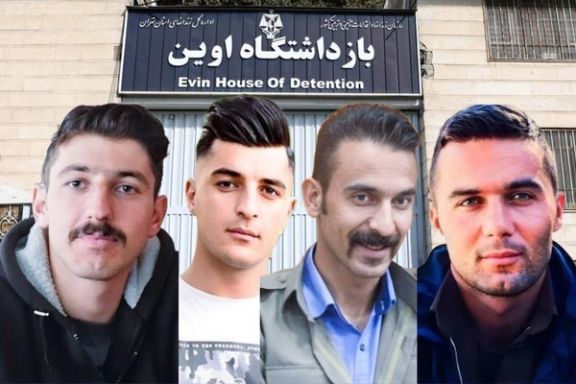
The families of four Kurdish political prisoners who face death sentences have been summoned to Evin Prison for a meeting, a sign of imminent execution.

The families of four Kurdish political prisoners who face death sentences have been summoned to Evin Prison for a meeting, a sign of imminent execution.
The Hengaw Human Rights Organization reported that Pejman Fatehi, Mohsen Mazloum, Mohammad (Hazhir) Faramarzi, and Vafa Azarbar are scheduled to meet their families at Evin, where they face imminent execution after receiving death sentences from Branch 26 of the Tehran Revolutionary Court.
Amnesty International earlier condemned their arbitrary detention since July 2022. The organization reported that the men were arrested by Iran's Ministry of Intelligence near Urmia, West Azarbaijan province, on July 20, 2022. State media later announced their arrest, accusing them of “espionage for Israel and plotting terrorist activities within the country.”
Footage aired on state television in October and December 2022 purportedly depicted the four men confessing to planning a bomb attack near the central city of Esfahan, allegedly under Israeli intelligence guidance.
The Islamic Republic, which has the highest rate of executions in the world after China, has executed 90 people just from December 22 to January 21.
In a recent revelation, UN experts disclosed that at least 834 people were executed in Iran in 2023, with eight of them linked to nationwide protests. The experts urgently called on the Iranian government to halt the surge of executions and undertake a comprehensive review of the use of the death penalty.
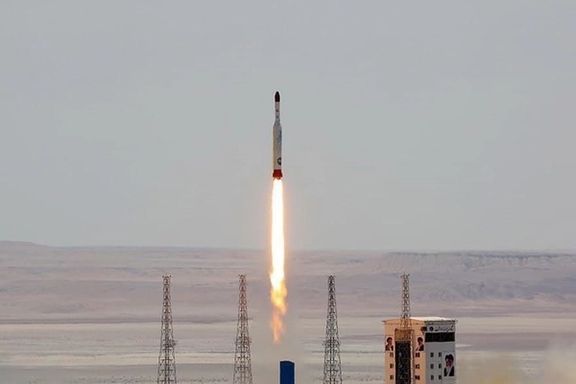
Iran simultaneously launched three satellites for the first time on Sunday using the domestically developed Simorgh (Phoenix) rocket, state media reported.
One satellite weighing 32 kg (70 pounds) and two nano-satellites of less than 10 kg each were sent to a minimum orbit of 450 km (280 miles), with the two smaller devices aimed at testing narrowband communication and geo-positioning technology, the reports said.
Iran’s satellite launches are viewed by the United States and its European allies as a possible cover to develop long-range ballistic missiles capable of carrying nuclear warheads.
A recent US intelligence assessment suggested that launching satellites “shortens the timeline” for Iran to develop an intercontinental ballistic missile. It is all the more worrying, experts say, since Iran is on the verge of nuclear capability, according to most intelligence estimates and recent International Atomic Energy Agency reports.
This was Tehran’s second satellite launch in one week. On January 21, the government announced the launch of the Soraya satellite, which it claimed was put into an orbit 750 kilometers above the earth.
The larger satellite, named "Mahda" and built by Iran's Space Agency, is meant to test the accuracy of the Simorgh rocket in delivering multiple cargoes to space.
European powers raised concerns about the launch of Soraya, saying that the space launch vehicle's technology could be used for the development of long-range ballistic missile systems.
Iran on Saturday dismissed European countries’ condemnation of its launch of the Sorayya satellite, saying peaceful technological advancement in the aerospace field was the country’s legitimate right.
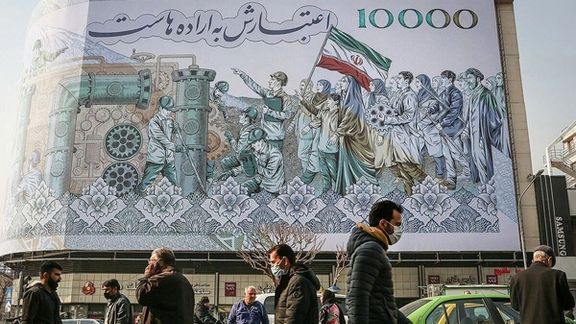
Despite extensive currency injections, Iran’s rial is on a nosedive amid heightened regional tensions and prospects of Donald Trump winning the US presidency.
The rial fell to 562,000 against the US dollar on Saturday, as uncertainty grows about a military escalation in the region and Trump's successes in US Republican primaries.
UPDATE: The expected escalation happened quickly. Following the news on Sunday of an attack on a US base in Jordan where three US serviceman died, and President Joe Biden's threat of retaliation, the weakened rial fell further to 575,000 per dollar.
The Iranian currency has fallen about 13-fold since 2018, when then-president Trump pulled the United States out of the 2015 JCPOA nuclear deal and imposed sanctions on Iran’s oil exports and international banking.
Additionally, the price of the British pound and euro, which soared to record highs in Iran last Tuesday, experienced further escalation on Saturday. Each pound was traded for 714,200 rials, while each euro fetched approximately 610,000 rials in Tehran's free currency market, which despite some official exchange rates, reflects the real value of the rial against foreign currencies.
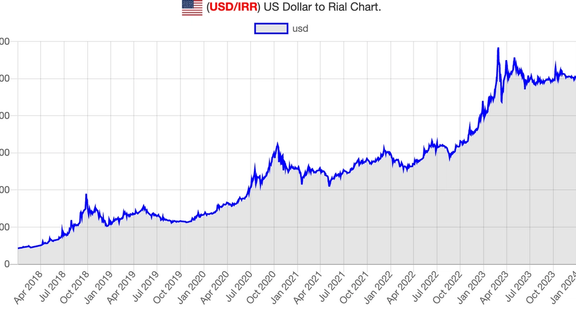
Amid the economic woes, Iran's leading economic newspaper Donya-e-Eqtesad has drawn attention to the potential ramifications of Trump's potential return to the White House, citing it as a factor contributing to the rise of foreign currencies and the price of gold. The paper also highlighted regional instabilities, particularly in the Red Sea, as factors fueling economic insecurity among Iranian investors. Last week, the devaluation of the rial intensified following Iran's ballistic missile strikes on targets in Iraq and Pakistan. Tensions were already heightened due to Iran-backed Houthis' assaults on commercial vessels in the Red Sea.
According to Donya-e-Eqtesad, market analysts attribute the rial’s freefall to various factors, including "increased cost of trade with Iraq," as well as the developments related to the US presidential elections.
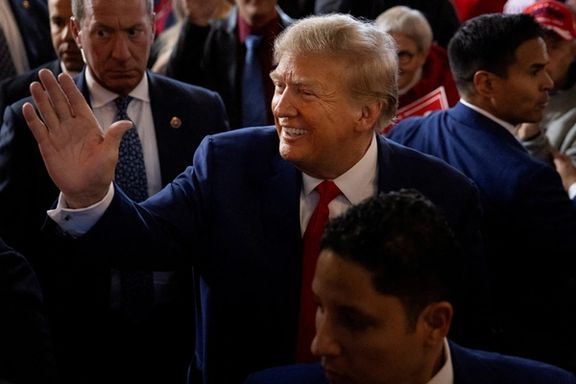
However, state-run media in Iran claim that the rise in the foreign currency exchange rates is just a “bubble” created by those who seek to benefit from fluctuations in the market. Iran’s chief banker Mohammad-Reza Farzin claims that the country enjoys a “favorable foreign exchange reserves.” Farzin said last week that fluctuations in the market are transient.
Fars news agency, affiliated with Iran’s Revolutionary Guards, claims that the rial will bounce back in the coming days, speculating that rial’s will settle at about 520,000 per dollar.
Asr-e Iran, a moderate-conservative website, published an article arguing that the impact of the news about Trump’s victory on Iran’s currency market is trumpeted as a manipulation tactic aimed at creating a false psychological and media atmosphere and fostering speculative inflation in Iran.
Rejecting the assumption that Iran’s oil exports increased due to a lax enforcement of US sanctions under the Biden administration, Asr-e Iran said the real reasons behind the rise in oil revenues are the government's efforts to sell oil through unofficial channels and the recovery of the global energy market following the slump caused by the COVID-19 pandemic. It added that geopolitical repercussions of the Russian invasion of Ukraine and the OPEC+ decision, in collaboration between Russia and Saudi Arabia, to curb crude supply have also prevented market saturation and created opportunities for the sale of sanctioned oil, including the Iranian crude. A very significant factor is the willingness of small Chinese refineries, known as "teapots," to buy sanctioned oil at discounted rates, the article highlighted.
All in all, there is a rumor circulating in Iran that the government was trying its best – mainly through injecting foreign currency into the market -- to keep the wobbly rial stable until the re-election of Joe Biden, who is believed to have overlooked Iran's sanction-busting. However, the growing chance of Trump landing at the White House has dashed Tehran’s hopes for the steady flow of its oil exports.
Sajjad Bourbour, a senior economic pundit, told Centrist Aftab News that the Iranian currency market heavily depends on the prospects of Tehran mending relations with the West. He mentioned that despite the Central Bank’s injection of approximately 2 quadrillion rials (about $4 billion) into the market to prevent rial's fall, the currency is at its all-time low.
With an annual inflation rate of at least 50 percent, the diminishing value of the rial signals further inflationary pressures in the months ahead. Monthly wages for workers, averaging less than $200, exacerbate the challenges within an economy where inflation outpaces salary adjustments. Such economic strains have led to strikes and protests across various sectors, including oil and gas production platforms and refineries.
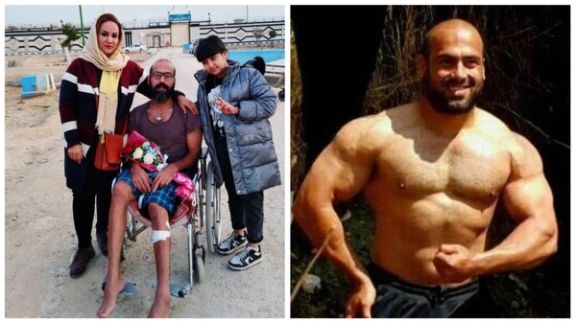
Khaled Pirzadeh, a former bodybuilding champion and political prisoner, has been transferred from Evin Prison to a hospital in Tehran.
According to reports from the US-based Human Rights Activists News Agency (HRANA), citing informed sources, Pirzadeh has been admitted to the intensive care unit due to a heart condition, specifically arrhythmia.
Sources close to Pirzadeh's family revealed that the political prisoner has been experiencing various health issues since last month, necessitating urgent angioplasty.
Pirzadeh gained attention when he was released from Ahvaz Prison on February 11, 2023, after enduring months of hunger strikes and grappling with critical physical conditions.
However, his freedom was short-lived as he was rearrested by security forces in Ahvaz approximately seven months later, in September. Subsequently, on October 15, 2023, he was transferred from Ward 209 of Evin Prison, operated by the Ministry of Intelligence, to Ward 6 of the same facility.
The former bodybuilding champion was handed a sentence of five years and eight months in prison on charges of "gathering and collusion and propaganda against the system."
According to relatives, Pirzadeh's health struggles render him unable to endure imprisonment due to his deteriorating physical condition.
His case brings to light broader concerns about the treatment of political prisoners in Iran, with numerous reports highlighting the lack of timely medical attention and disregard for their right to proper treatment by prison authorities.
Over the years, several political prisoners, including civil activist Sasan Niknafs, poet and filmmaker Baktash Abtin, and protesting citizen Javad Rouhi, lost their lives in prison. Despite mounting evidence implicating pressure, torture, and insufficient medical services in these deaths, the Islamic Republic has consistently shirked responsibility for their deaths.
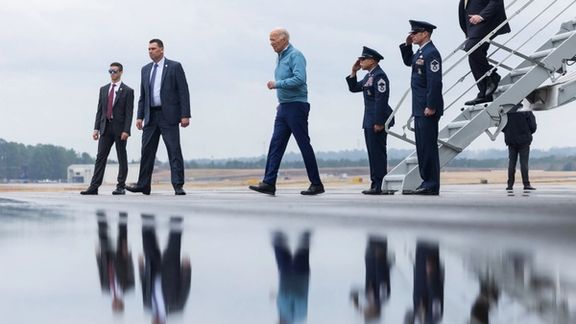
Iran International has learned that the US and its European allies are considering boosting sanctions on Iran due to Tehran's recent regional behavior, particularly its support for Houthi forces.
"Following the threats posed by the Islamic Republic in the region, especially its support for the Houthis and proxy groups in Iraq in recent months, which led to the formation of an international coalition in the Red Sea, recently, the United States and some Western countries have initiated discussions to intensify sanctions against Iran,” a diplomatic source familiar with ongoing discussions told Iran International. The diplomat added that the sanctions can be similar to what was in place before the JCPOA nuclear deal in 2015.
Iran International asked the US State Department to comment on the diplomat’s revelations, but an official said Washington does not comment on its potential sanctions policies. However, the administration did not dismiss the revelations.
In essence, the diplomatic source indicated that the Biden administration has decided to change its Iran policy, which has relied on diplomacy to persuade Tehran to reduce its uranium enrichment and refrain from regional aggression. In a move to apparently appease Tehran, the US unblocked around $16 billion of Iran’s money in Iraq and South Korea. Now, this potential shift would involve increasing sanctions pressure on the Islamic Republic.
Such a move could entail the activation of the UN Security Council’s ‘trigger mechanism’, a provision within the 2015 JCPOA nuclear agreement. The mechanism allows any participant of the JCPOA to demand the reinstatement of UN sanctions that were suspended when Iran and the world powers agreed to the nuclear deal. These sanctions included an arms embargo, strict monitoring of Iranian financial and technological dealings related to its nuclear and military programs and banking restrictions.
US allies, Britain, France and Germany are still participants in the JCPOA but refrained from activating the trigger mechanism in the past three years, as Tehran began violating nuclear limitations imposed by the JCPOA. The Biden administration was striving to return to the JCPOA, which President Donald Trump abandoned in May 2018, imposing sanctions on Iran.
During intense negotiations in 2021 and 2022, it is believed that the Biden administration decided not to vigorously enforce the Trump-era sanctions. This allowed Iran to boost its oil exports to China through illicit shipping methods. Tehran’s crude exports quadrupled between mid-2020 to late 2023, reaching 1.5 million barrels per day at one point.
Washington and its allies could also boost sanctions without resorting to the JCPOA ‘trigger mechanism.’ Major European countries could join the current US sanctions regime, prohibiting third parties from buying oil from Iran and restricting its international banking relations. Iran now can use the euro more easily than the US dollar in transactions. Europeans could also impose sanctions on third party banks, restricting the use of the euro in transactions with Tehran.
The Biden administration's potential shift in policy towards Tehran comes after the revelation that the United States had warned Iran of a potential terror attack one week before an ISIS twin bombing in Kerman on January 3, which resulted in the loss of 95 lives. Despite this friendly gesture, the Iranian government did not act on the tip, allowing thousands of people to visit the tomb of IRGC's Qasem Soleimani on that day. On the contrary, Iranian officials blamed the United States and Israel for the bombing and reiterated their unfounded accusations that the US has established and maintained the Islamic State group.
The Iranian government organized street celebrations hours after the October 7 Hamas invasion of Israel and the killing of more than 1,100 people, mostly civilians, as well as the taking of around 250 hostages. Tehran, which had armed and trained Hamas forces before the attack, has maintained its public support for the militant organization.
Moreover, its proxy forces in the region, including Shiite armed groups in Iraq and Syria, the Lebanese Hezbollah and Yemen’s Houthis have launched attacks on Israel and US interests. In Iraq and Syria, Iranian proxies have launched more than 150 rocket and drone attacks against US forces.
But a more serious development is the decision by Houthis to use their control over vast coastal stretches of Yemen to target international commercial traffic in the Red Sea area. The attacks began in mid-November after Iran’s Supreme Leader Ali Khamenei called on Muslim countries to blockade Israel. The US and UK have launched retaliatory strikes recently targeting Houthi military capabilities, but their attacks on vessels continue daily.
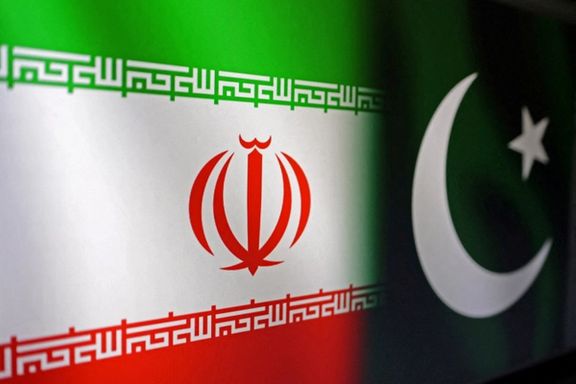
Unidentified gunmen in Iran's restive southeastern region killed nine Pakistani workers in a shooting incident amid recent tensions between the two neighboring countries.
"Deeply shocked by horrifying killing of 9 Pakistanis in Saravan. Embassy will extend full support to bereaved families," the Pakistani ambassador to Tehran, Muhammad Mudassir Tipu, said on the X platform. "We called upon Iran to extend full cooperation in the matter."
The confirmation of the incident by both Pakistan's ambassador and Iranian state media comes amid ongoing efforts by the two nations to mend ties following recent missile attacks on each others territories.
Expressing shock, Pakistani Ambassador Muhammad Mudassir Tipu extended condolences to the bereaved families while urging Iran's cooperation in the investigation. Concurrently, Iranian authorities claimed they are in active pursuit of the fleeing gunmen.
Baluch rights group Halvash reported that the victims were employed as laborers at an auto repair shop, with three others sustaining injuries during the assault. No claim of responsibility has been made for the incident in Saravan, situated in the Sistan-Baluchestan province.
"It is a horrifying and despicable incident and we condemn it unequivocally," Pakistani Foreign Ministry spokesperson Mumtaz Zahra Baloch said. "We are in touch with Iranian authorities and have underscored the need to immediately investigate the incident and hold to account those involved."
The shooting occurred ahead of a planned visit on Monday to Pakistan by Iranian Foreign Minister Hossein Amirabdollahian.
State media said the Pakistani and Iranian ambassadors were returning to their postings after being recalled when the neighbouring countries exchanged missile strikes last week aimed at what each said were militant targets.
"The Iran-Pakistan border creates an opportunity for economic exchanges... and must be protected against any insecurity," Iranian President Ebrahim Raisi told Mudassir Tipu as he received the ambassador's credentials on Saturday, state media reported.
Sistan-Baluchestan province, marred by sporadic clashes between security forces and militants, grapples with political tensions between Iran's Shiite government and the Baluch Sunni population.
Iran has some of the lowest fuel prices in the world and this has also led to increasing fuel-smuggling to Pakistan and Afghanistan despite a crackdown by Iranian border guards.